
UNDATED – Affordable Housing is out of reach in Indiana for low-wage Hoosier workers in order to afford a modest, two-bedroom apartment at fair market rent in Indiana. Full-time Hoosier workers need to earn $16.57 per hour to afford such a living space. This is Indiana’s 2021 Housing Wage, revealed in a national report released today. The report, Out of Reach, was jointly released by the National Low Income Housing Coalition (NLIHC), a research and advocacy organization dedicated solely to achieving affordable and decent homes for people with the lowest incomes and Prosperity Indiana, the statewide membership organization for the individuals and organizations strengthening Hoosier communities.
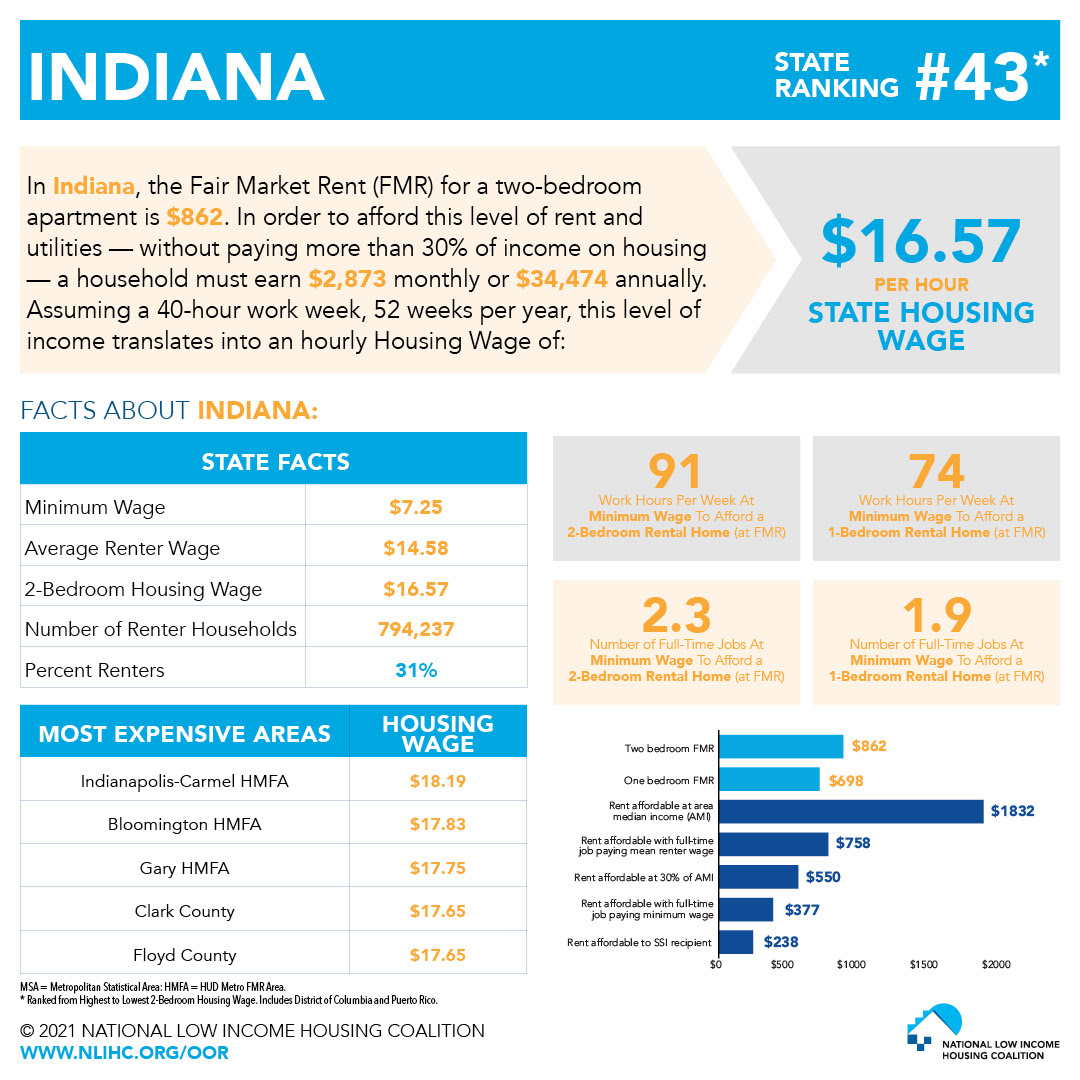
This year, the Out of Reach report is released 16 months into a devastating pandemic, which has created enormous suffering. In addition to the lives lost, COVID-19 also created an economic crisis that pushed millions of low-wage workers out of work. The public health crisis is not over, but as the country begins to imagine life after COVID, it is imperative to also address the profound economic fallout for the lowest-income and most marginalized members of our communities. Prior to the pandemic, more than 7.6 million extremely low-income renters were already spending more than half of their limited incomes on housing costs, including more than 145,000 Hoosier households, sacrificing other necessities to do so.After a year of job losses, furloughs, and limited hours, many of these Hoosier households will be even worse off in 2021. Across Indiana, a renter needs to earn $16.57 per hour to afford a modest two-bedroom rental home without spending more than 30% of their income on housing cost, up from $16.32 in 2020; or $13.43 per hour to afford a one-bedroom home, up from $16.13 in 2020. While the Housing Wage varies by county and metropolitan area, low-wage workers everywhere throughout Indiana struggle to afford their housing, requiring no less than $14.08 and as much as $18.19 per hour for a modest two-bedroom unit.Jessica Love, executive director for Prosperity Indiana, said, “The cost of housing in Indiana just keeps rising, which means the state Housing Wage – what you really need to earn for your home to be affordable to you – keeps going up. Unfortunately, the average renter’s wage hasn’t risen much for Hoosiers, especially when compared to our Midwestern peers. And this only serves to widen the disparities experienced by the lowest income renters.”
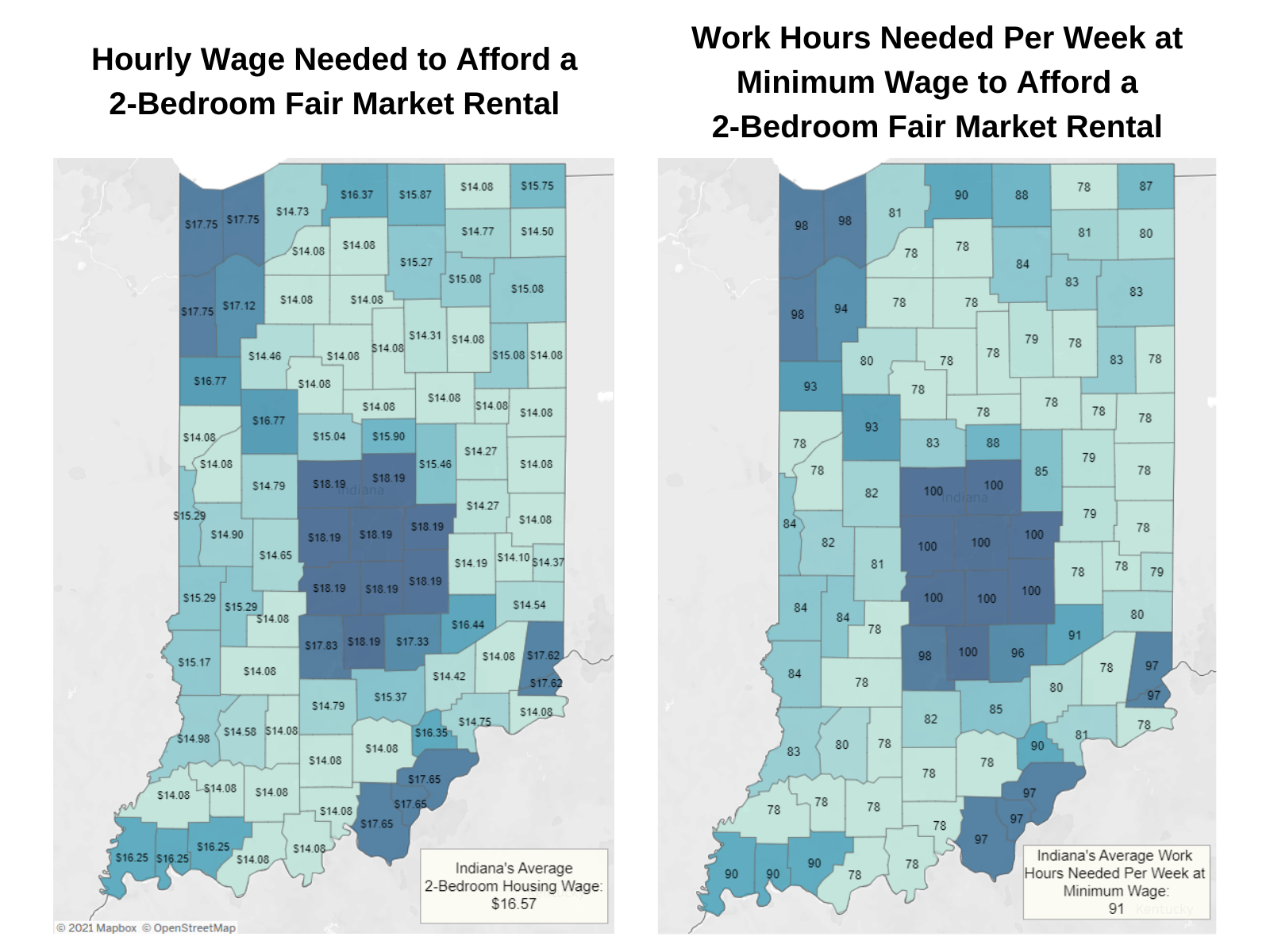
The federal minimum wage has remained at $7.25 an hour without an increase since 2009, not keeping pace with the high cost of rental housing. In no state, including Indiana, can a minimum wage renter working a 40-hour workweek afford a modest one- or two-bedroom rental unit at the average fair market rent. Working at Indiana’s minimum wage at the federal floor of $7.25 in 2021, a Hoosier wage earner must have 1.9 full-time jobs or work 74 hours per week to afford a modest one-bedroom apartment, up from 73 in 2020; and earn 2.3 full-time jobs or work 91 hours per week to afford a two-bedroom apartment, up from 90 in 2020.
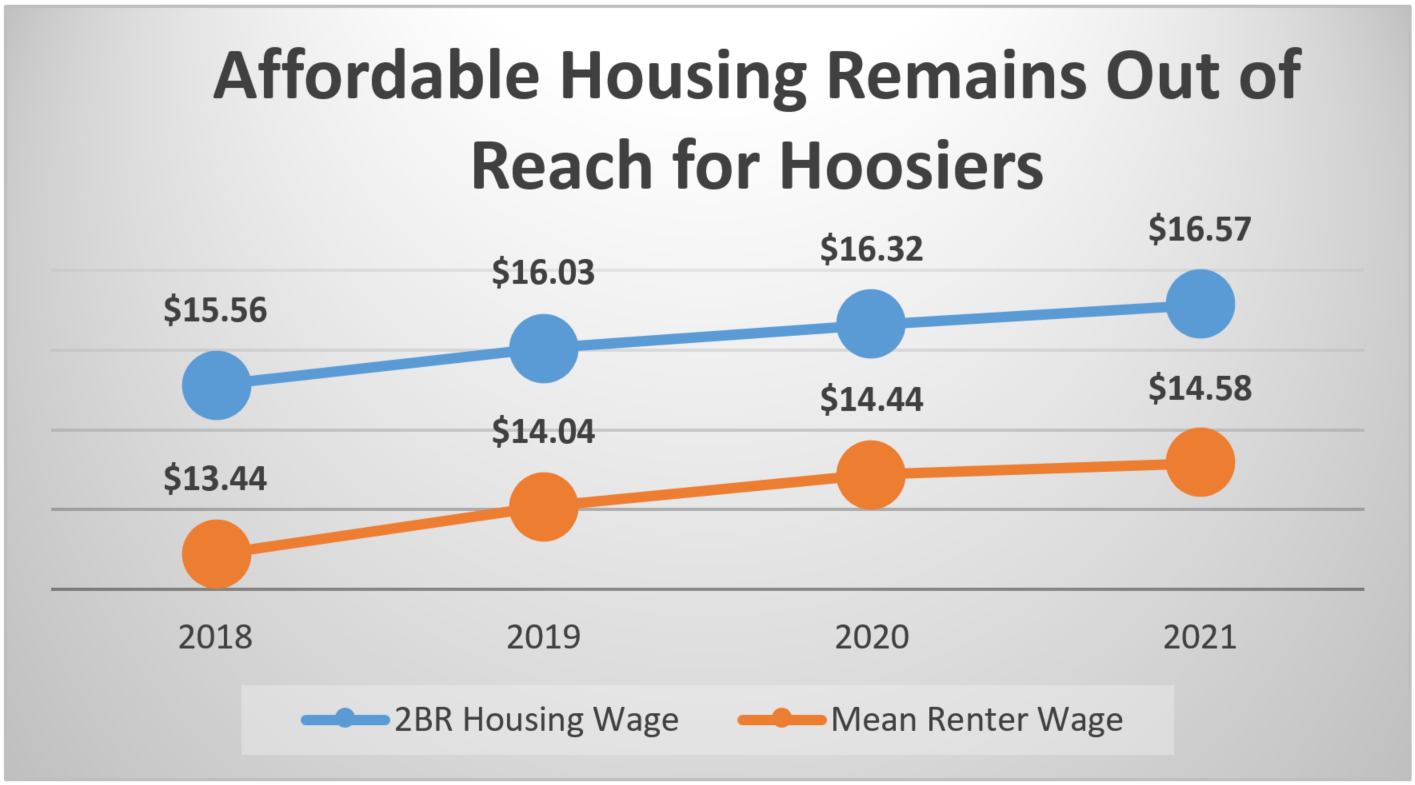
The typical Hoosier renter earns $14.58 per hour, which is $1.99 less than the hourly wage needed to afford a modest unit. Even before the additional economic pressures of the COVID-19 pandemic, Indiana’s renter wages were consistently far below the state’s housing cost. Indiana’s mean renter wage is increasingly out of step with that of our Midwestern neighbors, with Hoosiers now earning $0.77 per hour less than the average of other Midwest states.
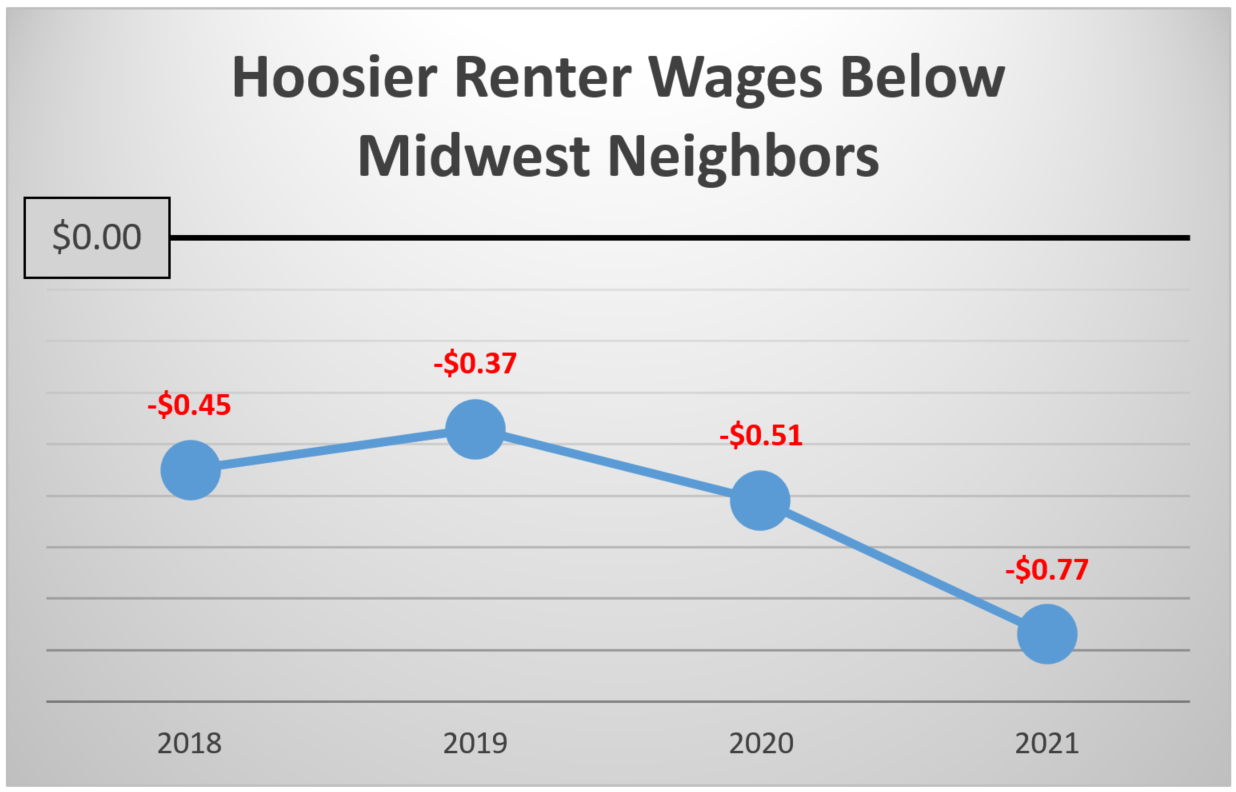
Despite Indiana’s reputation for having a low cost of living, working full-time does not guarantee affordable housing for many Hoosiers in Indiana’s largest occupations. The median wage for 10 of Indiana’s top 20 largest occupations is below the two-bedroom Housing Wage, with six of those occupations paying less than what is needed for even a one-bedroom unit.
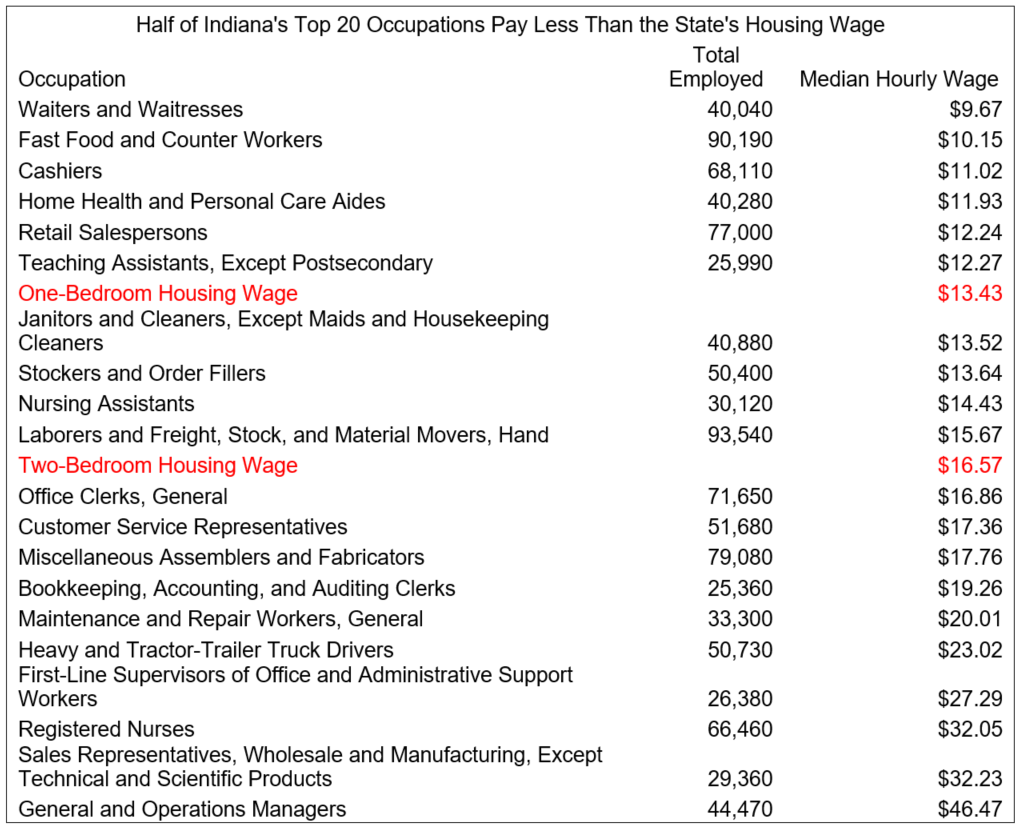
Housing wages based on HUD fair market rents.“Housing is a basic human need and should be regarded an unconditional human right,” said Diane Yentel NLIHC president and CEO. “With the highest levels of job losses since the Great Depression and a pandemic that continues to spread, low-income workers and communities of color are disproportionately harmed. The enduring problem of housing unaffordability ultimately calls for bold investments in housing programs that will ensure stability in the future. Without significant federal intervention, housing will continue to be out of reach. This leaves millions susceptible to the overwhelming consequences of Congressional inaction.”For additional information, visit: http://www.nlihc.org/oor and contact Prosperity Indiana for additional Indiana county- and metro-area data.



